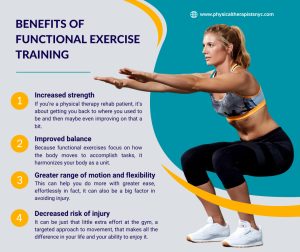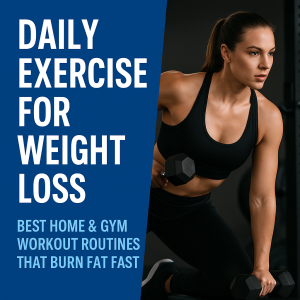Functional Fitness for Seniors: Aging Stronger, Living Better
Aging doesn’t mean slowing down — it means moving smarter. Functional fitness for seniors is not just a trend; it’s a vital approach to staying independent, active, and confident as we age. This form of exercise focuses on strength, balance, mobility, and endurance — the core elements needed to perform everyday tasks like walking, climbing stairs, carrying groceries, or even playing with grandchildren and Fitness For Senior.
In this blog, we’ll explore what functional fitness is, why it matters for seniors, and the best routines and tips to get started safely and effectively.
What is Functional Fitness?
Functional fitness involves exercises that mimic real-life movements to improve the body’s ability to perform daily activities. Rather than isolating one muscle group, it engages multiple joints and muscles together, just like in real-world motions.
For example, a squat strengthens the same muscles you use to sit down and stand up. A simple overhead press prepares you for lifting objects onto a shelf. These are everyday tasks that become challenging as we age — unless we train for them.

Why Seniors Should Prioritize Functional Fitness For Senior
As we grow older, we naturally experience a decline in muscle mass, joint flexibility, balance, and bone density. Functional fitness addresses these issues head-on, providing benefits such as:
Improved Balance and Stability
Falls are one of the leading causes of injury among seniors. Functional exercises train the body to remain stable and coordinated, helping prevent dangerous accidents.
Increased Strength and Mobility
Building muscle helps with mobility and reduces the effort required to do common tasks. Stronger legs, arms, and core muscles make it easier to maintain independence.
Better Posture and Joint Health
Functional movements promote better posture, reduce back pain, and prevent stiffness in joints — making everyday life more comfortable.
Boosted Confidence and Mental Health
Staying active improves mood, sharpens the mind, and boosts confidence in one’s physical abilities, creating a more positive outlook on aging.

Top Functional Exercises for Seniors
Here are some simple and safe functional fitness exercises that seniors can incorporate into their routine Fitness For Senior:
- Sit-to-Stand (Chair Squats)
Benefit: Builds leg strength and simulates standing up from a chair.
- Sit on a sturdy chair.
- Cross your arms over your chest or place them on your thighs.
- Slowly stand up, then sit down with control.
- Repeat 10–15 times.
- Wall Push-Ups
Benefit: Strengthens upper body muscles.
- Stand facing a wall, arms straight in front of you.
- Place your hands on the wall, shoulder-width apart.
- Bend your elbows to bring your chest closer to the wall, then push back.
- Repeat 10–12 times.
- Heel-to-Toe Walk
Benefit: Improves balance and coordination.
- Walk in a straight line, placing the heel of one foot directly in front of the toes of the other.
- Keep your gaze forward and arms out if needed for balance.
- Walk 10–15 steps and repeat.
- Overhead Reach with Light Weights
Benefit: Strengthens shoulders and improves range of motion.
- Hold light dumbbells or water bottles.
- Lift both arms overhead, then slowly lower them.
- Do 10–12 reps.
- Standing March
Benefit: Boosts coordination and core strength.
- Stand tall and march in place, lifting knees to hip level if possible.
- Swing arms gently with each step.
- March for 30 seconds to 1 minute.
Tips for a Safe Functional Fitness Routine
- Start Slow: Don’t rush into exercises. Begin with low-impact movements and gradually build up intensity.
- Focus on Form: Proper form prevents injuries and ensures maximum benefit. Consider working with a fitness coach or physical therapist.
- Use Support: If needed, use a chair or wall for balance and support while doing standing exercises.
- Warm Up and Cool Down: Spend 5–10 minutes stretching and warming up before starting, and cool down with gentle stretching after workouts.
- Stay Consistent: Aim for 3–5 days a week of light to moderate activity to see real improvements over time.
Functional Fitness at Home or the Gym
You don’t need expensive gym equipment to get started. Most functional exercises can be done at home using household items like chairs, water bottles, or resistance bands Fitness for Senior.
However, joining a local senior fitness class or community center can offer:
- Guided sessions
- Social interaction
- Motivation and accountability
Some popular fitness programs for seniors include:
- SilverSneakers
- Chair Yoga
- Tai Chi for Balance
- Water Aerobics
You Can also read this Info:-
AI in cybersecurity is revolutionizing digital defense by enabling faster threat detection, smarter risk assessment, and real-time response to cyberattacks. By leveraging machine learning and automation, AI helps protect sensitive data, prevent breaches, and outsmart hackers—making it a game-changer in the fight against evolving cyber threats.
Nutrition and Recovery: Supporting Your Fitness Goals
Don’t forget — movement is only part of the healthy aging equation.
- Stay hydrated.
- Eat protein-rich foods to support muscle repair.
- Include calcium and vitamin D to strengthen bones.
- Get enough sleep for muscle recovery and energy.
🗓️ Daily Workout and Meal Routine Table
| Time | Activity | Workout / Meal Details |
| 6:30 AM – 7:00 AM | 🌅 Wake Up & Hydrate | 1 glass warm water with lemon + light stretching |
| 7:00 AM – 7:45 AM | 💪 Morning Workout | – 5 min warm-up (jogging, jumping jacks) – 20 min strength or bodyweight workout – 10 min cool-down stretch |
| 8:00 AM – 8:30 AM | 🥣 Healthy Breakfast | – Oats with fruits and nuts – OR Eggs with whole grain toast – Herbal tea or black coffee |
| 10:30 AM | 🍎 Mid-Morning Snack | – A banana or apple – Handful of almonds or boiled eggs |
| 1:00 PM | 🥗 Lunch | – Grilled chicken/tofu + brown rice or quinoa – Steamed veggies – Buttermilk or light soup |
| 3:30 PM | ☕ Evening Snack | – Green tea + protein bar or sprouts salad |
| 6:00 PM – 6:30 PM | 🧘 Evening Movement | – Light walk, yoga, or mobility stretches |
| 7:30 PM – 8:00 PM | 🍲 Dinner | – Lentil soup or stir-fried veggies – Small portion of complex carbs – Herbal tea |
| 9:30 PM | 😴 Bedtime Wind Down | – Screen-free time – Light stretching or reading – Sleep by 10:00 PM |
Pro Tips for Success:
- Drink 2.5–3 liters of water daily
- Stick to whole foods and avoid processed meals
- Adjust workout intensity to your fitness level
- Track your meals and progress weekly
- Get 7–8 hours of sleep every night
Conclusion: Age is Just a Number — Move to Prove It
Functional fitness empowers seniors to live life to the fullest. Whether it’s gardening, dancing, playing with grandchildren, or traveling the world — maintaining strength, balance, and mobility makes it all possible.
You don’t need to be an athlete to be strong. Start small, stay consistent, and embrace movement as medicine. The goal isn’t just to live longer — it’s to live better Fitness For Senior.
Ready to begin your journey toward stronger, smarter aging?
Start with 10 minutes today — your future self will thank you.




awesome